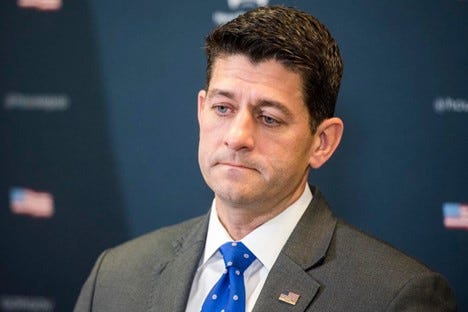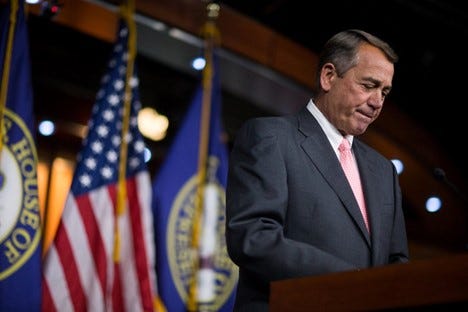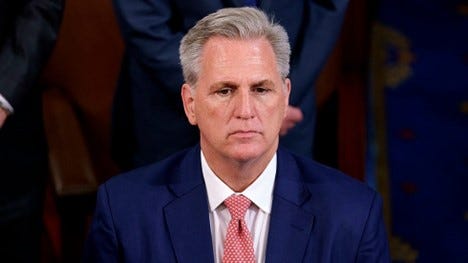New House Speaker: The Hot Seat Awaits
2023 will feature a slim majority for an extremely divided GOP. Who will lead this fractured party?
In the past decade, Republican majorities have redefined the role of House speakers/leadership. The final count for House control remains unknown, but with Republicans clinching the 218 count for majority power, the question of speakership comes into view. To understand the modern House Speaker position, we need to understand the recent history of the role.
The last GOP House Speaker, Paul Ryan, was constantly overshadowed by President Trump and the “Freedom Caucus” full of Donald Trump’s most ardent supporters. Ryan’s traditional GOP style clashed with Donald Trump’s policy decisions and crass tweets. Every outrageous tweet and each new situation brought reporters swarming Speaker Ryan with questions like, “What do you plan to tell Trump about X issue,” or “How will you legislate with Trump’s statement on issue Y?” Moderate house members criticized Ryan for not doing enough to contain Trump, and Freedom Caucus members criticized Ryan for not doing enough for Trump.
After a 20-year run in congress that was mainly on a straight-up trajectory (including a spot as Mitt Romney’s VP pick), Paul Ryan resigned because “his family clock was ticking.” No ambitious 48-year-old politician in one of the top leadership positions calls it quits for no reason. The reality is Ryan should still be a star in the Republican Party. Constant clashing with his party made the job untenable, a trend on which I will elaborate
Let’s look at another former speaker for further evidence: John Boehner. Boehner served as speaker before Ryan took his place, from 2011 to 2015. Boehner’s term was marked by more Republican infighting, primarily against the Freedom Caucus. Fighting between the moderate speaker and the far-right Freedom Caucus was so intense that Boehmer was threatened numerous times that he would be ousted from the role in a coup against him. In 2015 the pressure became too much to bear, which led to a surprise resignation at the end of October. During his resignation speech, Boehner did not mince words.
“I planned to announce on November 17 that I would resign at the end of the year. But it’s become clear to me that prolonged leadership turmoil would do irreparable harm to the institution.”
In interviews after his resignation Boehner would infamously call some of his Freedom Caucus colleagues “political terrorists.” Here’s another quote from those interviews referring to Freedom Caucus member (and Trump ally) Jim Jordan:
“I just never saw a guy who spent more time tearing things apart - never building anything, never putting anything together.”
These two accounts reveal the significant obstacle for GOP House speakers – not Democrats and not institutional challenges – but their own party. The last two Republican speakers resigned due to the Republican Party’s inability to agree on various issues and tactics. Competing type A personalities make politicians ego more important than vote counting and getting bills passed. House leadership for the GOP has turned into a seat of ejection rather than a seat of power. Howard Kurtz, author of “Media Madness,” put this simply:
“What this really speaks to is, can anybody be a successful speaker of the House with this GOP majority?” “Boehner was frustrated and quit. Ryan was frustrated and quit.”
Enter minority leader Kevin McCarthy, who, in my view, has had an extremely weak showing as minority leader. Since 2019, two incidents stick out. First, in 2021 MAGA partisan and Q-Anon believer Marjorie Taylor Greene was found to support executing prominent Democrats in 2018 and 2019 before running for congress. McCarthy (in typical fashion) sat on the fence, condemning Greene’s statements but taking no action against them. This forced Democrats (and some Republicans) to vote to remove Greene from all House committees. This incident shows that McCarthy will back down against freshman members of his own party, which is not a good start for a speaker who needs to be strong enough to resist both sides of his party to build consensus.
McCarthy also famously denounced Donald Trump on the House floor after January 6, only to be seen with him just 22 days later, visiting Trump at Mar-a-Lago and posing for a picture to boot. He has not repeated his denunciations of Trump since. This type of political fence-sitting is extremely risky for a minority leader and could be a death sentence for a speaker. Sitting on the fence and switching between moderate and MAGA will quickly upset both sides.
McCarthy recently won an internal GOP vote for speakership 188 to 31 against Freedom Caucus member Andy Biggs (R AZ). Although he won this vote among his colleagues, McCarthy will have to win 218 votes in January to secure the speakership role, a vote count he clearly cannot reach right now. Regardless of how the remainder of house districts turn out, McCarthy’s potential majority will be extremely slim, maybe 5-8 members, far less than what Ryan and Boehner had.

The Freedom Caucus has already challenged McCarthy for the speakership role and will challenge McCarthy on anything he does as speaker that does not fall under the MAGA agenda. Boehner’s “political terrorist” line is the best way to view Freedom Caucus members. Many have no former governing experience. They are not interested in passing bills or accomplishing anything besides making noise and investigating Democrats. This means they have nothing to lose in negotiations with moderate members. The MAGA members do not need anything from leadership; they know it. Long gone are the times when ending up on the opposite side of the House speaker or House whip was a political death sentence. Once again, the Freedom Caucus (and MAGA members generally) will likely be the biggest problem for McCarthy or any other moderate who ascends to leadership. Good luck to whoever secures this erstwhile influential role.
TLDR Republicans have finally taken back the House of Representatives. The role for House Speaker is up for grabs. Can anyone make it work?






